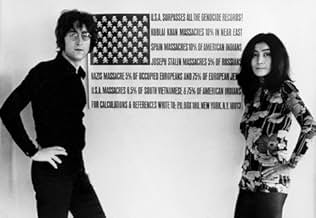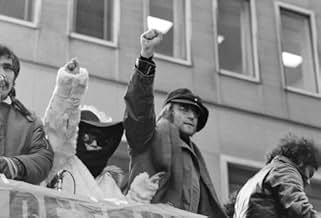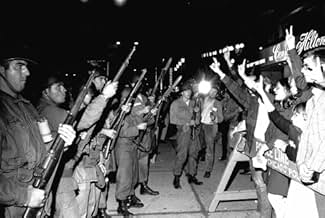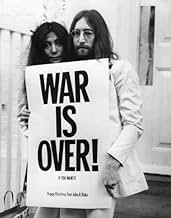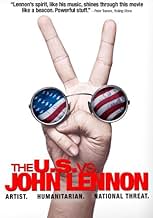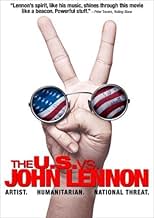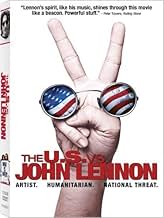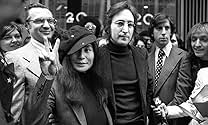AVALIAÇÃO DA IMDb
7,3/10
5,7 mil
SUA AVALIAÇÃO
Adicionar um enredo no seu idiomaA documentary on the life of John Lennon, with a focus on the time in his life when he transformed from a musician into an antiwar activist.A documentary on the life of John Lennon, with a focus on the time in his life when he transformed from a musician into an antiwar activist.A documentary on the life of John Lennon, with a focus on the time in his life when he transformed from a musician into an antiwar activist.
- Direção
- Roteiristas
- Artistas
- Prêmios
- 2 indicações no total
John Lennon
- Self
- (cenas de arquivo)
- Direção
- Roteiristas
- Elenco e equipe completos
- Produção, bilheteria e muito mais no IMDbPro
Avaliações em destaque
I was in high school in 1980 when John Lennon was assassinated and all I really knew about him was that he was a musician and a member of the Beatles. I found this documentary fascinating, which gave an excellent insight into Lennon's participation in and effect on the anti-war movement in the US during the Vietnam War. I came away with a greater respect of the man and what he tried to do along with with his wife and the pressures they faced from the US government who wanted to silence them. Although some parts were something of a rehash about the anti-war movement in general, the skillful editing along with use of numerous interviews and recorded material still made it enjoyable and informative. One can not help but draw a comparison between this film and message and the on-going debate over the Iraq war, which I suspect was one of the goals of those who made it. I saw this film at a suburban Washington DC theater this weekend, and when one of the interviewees said "John Lennon represented light, and Mr. Nixon and Mr. Bush represented death" at least half the audience clapped. I guess it made its point to this audience. If you get a chance to see it, I highly recommend it.
"Imagine no possessions, I wonder if you can. No need for greed or hunger. A brotherhood of man. Imagine all the people, Sharing all the world. You may say I'm a dreamer. But I'm not the only one. I hope someday you'll join us. And the world will live as one." John Lennon, "Imagine" "All we are saying, Is give peace a chance." John Lennon, Give Peace a Chance I can't help hearing the song "Imagine" and feeling a little teary-eyed. I still remember being part of the worldwide vigil after John Lennon's murder and hearing the idealistic song, depicting a vision at that time suddenly sounding cruelly out-of-reach. The Beatles is one of those very few groups that seems to enjoy near-universal appreciation, from folks in their teens through those in retirement, including classical music aficionados as well as heavy metal enthusiasts. The songwriting power behind the group was primarily the genius of John Lennon and Paul McCartney, both of whom continued on to successful, creative solo careers.
With that background, how could I not jump at the opportunity to see a film about John Lennon? "The U.S. vs. John Lennon" is a documentary about the life of Lennon, specifically focusing on his peace activism during the Vietnam War era. I was certainly aware of his political engagement and songs such as "Give Peace a Chance", "Power to the People", and "Happy Christmas (War Is Over)". And I vaguely recall that there were some immigration issues that this English man faced in America. But I was not fully aware of, or perhaps forgot, how strongly the Nixon administration sought to deport John Lennon simply based on his views and activism.
The film moved at a very appropriate pace, introducing enough biography to help better understand the germane issues, quickly going through John's childhood, involvement with the Beatles, and marriage to his wife Yoko Ono. Consummate musician, John is quoted as saying that all that he really wanted to do was to make music. But the escalating violence in Vietnam made him an outspoken critic of the war. A master of publicity, he even turned what he knew would be dogged press during his honeymoon to his advantage by staging a well covered love-in for peace urging love and not war.
Richard Nixon held the office of President of the United States from 1969-1974 and is the only President to have resigned, facing impeachment for the "Watergate" scandal and clear abuse of power. In spite of election promises, Nixon plunged the country into deeper war with Vietnam amidst growing public outcry.
With the help of the heavy-handed J. Edgar Hoover, Director of the Federal Bureau of Investigation for almost fifty years (from 1924 until his death in 1972), the Nixon administration sought to silence some in the anti-war movement. It tried to deport John Lennon and, finding that he had a small charge of marijuana possession filed back in England earlier, used that as a pretext to demand his departure.
Eventually, Lennon's lawyer countersued and proved that the Nixon administration has conspired against him, with people from the very top of the government involved. Lennon won and was granted permanent immigration status to allow him to stay in New York, the city he loved. Unfortunately, in 1980, John Lennon was gunned down outside of his New York apartment by a deluded fan.
"The U.S. vs. John Lennon" is a moving film about a person larger than reality as if being a prolific and well-recognized songwriter weren't enough, he was a singer, guitarist, author, and political leader who embodied nonviolence and peace, influenced by Gandhi and he was very influential in each of these areas. Many would say that Lennon was one of the key spokespersons of the generation that came of age in the 1960s, and offered a vision of a world united by zest for living together and not divided by petty differences. It is also a film about how unchecked power can try to wield unfair influence in attacking its perceived enemies.
A vivid history lesson accompanied by many brilliant songs of John Lennon's, I highly recommend "The U.S. vs. John Lennon" to all (note that it is rated PG-13 for some "strong language, violent images and drug references" but I wonder if that is a little overstated). Viewers will (re)learn important biographical and historical aspects of the man and times, and, more importantly, see John Lennon's message for its universality and timelessness. The music alone will likely rekindle or begin new memories, and the documentary is a fascinating review of an important era in recent history.
8 stars out of 10
--Dilip Barman, Durham, NC
With that background, how could I not jump at the opportunity to see a film about John Lennon? "The U.S. vs. John Lennon" is a documentary about the life of Lennon, specifically focusing on his peace activism during the Vietnam War era. I was certainly aware of his political engagement and songs such as "Give Peace a Chance", "Power to the People", and "Happy Christmas (War Is Over)". And I vaguely recall that there were some immigration issues that this English man faced in America. But I was not fully aware of, or perhaps forgot, how strongly the Nixon administration sought to deport John Lennon simply based on his views and activism.
The film moved at a very appropriate pace, introducing enough biography to help better understand the germane issues, quickly going through John's childhood, involvement with the Beatles, and marriage to his wife Yoko Ono. Consummate musician, John is quoted as saying that all that he really wanted to do was to make music. But the escalating violence in Vietnam made him an outspoken critic of the war. A master of publicity, he even turned what he knew would be dogged press during his honeymoon to his advantage by staging a well covered love-in for peace urging love and not war.
Richard Nixon held the office of President of the United States from 1969-1974 and is the only President to have resigned, facing impeachment for the "Watergate" scandal and clear abuse of power. In spite of election promises, Nixon plunged the country into deeper war with Vietnam amidst growing public outcry.
With the help of the heavy-handed J. Edgar Hoover, Director of the Federal Bureau of Investigation for almost fifty years (from 1924 until his death in 1972), the Nixon administration sought to silence some in the anti-war movement. It tried to deport John Lennon and, finding that he had a small charge of marijuana possession filed back in England earlier, used that as a pretext to demand his departure.
Eventually, Lennon's lawyer countersued and proved that the Nixon administration has conspired against him, with people from the very top of the government involved. Lennon won and was granted permanent immigration status to allow him to stay in New York, the city he loved. Unfortunately, in 1980, John Lennon was gunned down outside of his New York apartment by a deluded fan.
"The U.S. vs. John Lennon" is a moving film about a person larger than reality as if being a prolific and well-recognized songwriter weren't enough, he was a singer, guitarist, author, and political leader who embodied nonviolence and peace, influenced by Gandhi and he was very influential in each of these areas. Many would say that Lennon was one of the key spokespersons of the generation that came of age in the 1960s, and offered a vision of a world united by zest for living together and not divided by petty differences. It is also a film about how unchecked power can try to wield unfair influence in attacking its perceived enemies.
A vivid history lesson accompanied by many brilliant songs of John Lennon's, I highly recommend "The U.S. vs. John Lennon" to all (note that it is rated PG-13 for some "strong language, violent images and drug references" but I wonder if that is a little overstated). Viewers will (re)learn important biographical and historical aspects of the man and times, and, more importantly, see John Lennon's message for its universality and timelessness. The music alone will likely rekindle or begin new memories, and the documentary is a fascinating review of an important era in recent history.
8 stars out of 10
--Dilip Barman, Durham, NC
Those who do not learn from history are doomed to repeat it. If "The U.S. vs. John Lennon" is anything, it's an examination of the similarities between the Nixon Administration and the national debacle that was the Vietnam War, compared to the current Bush Administration and the national debacle that is the Iraq War. The difference, of course, is that Nixon had John and Yoko Lennon to contend with. Who do we have to lead our protests and write our anthems? Michael Moore? Not good enough.
When Lennon moved to New York City in 1970, the Nixon Administration was terrified that he had the power to organize the anti-war protesters and affect the outcome of elections (particularly Nixon's 1972 run for re-election). Lennon was wiretapped and followed by the FBI (which was being used at that time to "quell decent"). The Immigration and Naturalization Service tried for five years to deport him, but he got a lawyer and fought back, and in 1976, on his birthday, on his son Sean's birthday, he learned that he and Yoko had won their case, and they could stay.
"The U.S. vs. John Lennon" makes you want to take a stand, organize a protest, demand peace, and stick it to the man!
When Lennon moved to New York City in 1970, the Nixon Administration was terrified that he had the power to organize the anti-war protesters and affect the outcome of elections (particularly Nixon's 1972 run for re-election). Lennon was wiretapped and followed by the FBI (which was being used at that time to "quell decent"). The Immigration and Naturalization Service tried for five years to deport him, but he got a lawyer and fought back, and in 1976, on his birthday, on his son Sean's birthday, he learned that he and Yoko had won their case, and they could stay.
"The U.S. vs. John Lennon" makes you want to take a stand, organize a protest, demand peace, and stick it to the man!
For those who are too young to remember the real John Winston Ono Lennon -- this film is a good introduction to why he mattered so, why so many people were (and are) devoted to him as an artist and a man, why he was truly the most original voice of his generation.
The film is not perfect -- but in its defense, it covers an extraordinary amount of material and does it well.
Lennon lived 100 lifetimes between 1969 and 1975.
This film concentrates on the biggest conflict he faced at that time: his struggles to remain in the US, and the right-wing paranoia (exemplified by FBI director J Edgar Hoover and Nixon's hatchet man, John Ehrlichman.)
Lennon's sincerity, his naiveté, his charisma shine throughout.
Yoko has been attacked (so what else is new) for being such a strong presence in the film but she was right there beside him. They lived it all together. And she does not use her camera time to diminish him in any way.
Strong recommendation -- primarily because we have to remind ourselves that there are times to speak up and times to act.
John Lennon: we miss you so.
The film is not perfect -- but in its defense, it covers an extraordinary amount of material and does it well.
Lennon lived 100 lifetimes between 1969 and 1975.
This film concentrates on the biggest conflict he faced at that time: his struggles to remain in the US, and the right-wing paranoia (exemplified by FBI director J Edgar Hoover and Nixon's hatchet man, John Ehrlichman.)
Lennon's sincerity, his naiveté, his charisma shine throughout.
Yoko has been attacked (so what else is new) for being such a strong presence in the film but she was right there beside him. They lived it all together. And she does not use her camera time to diminish him in any way.
Strong recommendation -- primarily because we have to remind ourselves that there are times to speak up and times to act.
John Lennon: we miss you so.
I hope everyone sees this film, as it is a window into the life of an extraordinary person, who really did influence a generation with his music and his courage. But, I especially hope that the generations that came after John Lennon left us, so unexpectedly, have a chance to see this thoughtful and fitting tribute to the gentle artist who turned the hurt he experienced as a child into an international revolution with a spirit so open and willing to risk everything he had to teach the world that all we really need is love. This film explains to all of us, who were too young to understand what was going on, at the time, how John Lennon was persecuted by the U.S. government for simply expressing his opinion about the war in Viet Nam. How he was investigated, tapped, and followed, then threatened with deportation, in an effort to derail a tour that might have had a significant influence on the outcome of the 1972 presidential election, in which Richard Nixon was re-elected. The scenes of teenagers burning their Beatles records in protest of his quip that the Beatles had become more popular than Jesus, are eerily parallel with the Dixie Chicks fans who did the same thing. Excerpts from Nixon's speeches about the war are almost word-for-word the same rhetoric we get from Bush. This film is important, and moving, and includes some of the best music I know I'll ever hear in this lifetime. Go see it and get inspired.
Você sabia?
- Citações
Gore Vidal: Patriotism is the last refuge of the scoundrel.
- Trilhas sonorasJohn Sinclair
Written by John Lennon
Performed by John Lennon
Courtesy of Capitol Records
Under license from EMI Film & Television Music
Principais escolhas
Faça login para avaliar e ver a lista de recomendações personalizadas
- How long is The U.S. vs. John Lennon?Fornecido pela Alexa
Detalhes
Bilheteria
- Faturamento bruto nos EUA e Canadá
- US$ 1.109.146
- Fim de semana de estreia nos EUA e Canadá
- US$ 69.143
- 17 de set. de 2006
- Faturamento bruto mundial
- US$ 1.408.065
- Tempo de duração
- 1 h 39 min(99 min)
- Cor
- Proporção
- 1.78 : 1
Contribua para esta página
Sugerir uma alteração ou adicionar conteúdo ausente


